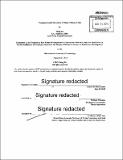Changing spatial structure of major Chinese cities
Author(s)
Xu, Meng, S.M. Massachusetts Institute of Technology
DownloadFull printable version (7.898Mb)
Other Contributors
Massachusetts Institute of Technology. Center for Real Estate. Program in Real Estate Development.
Advisor
William Wheaton.
Terms of use
Metadata
Show full item recordAbstract
This paper examines the spatial structures of commercial real estate buildings (Offices, Retails) in four Chinese cities: Beijing, Shanghai, Shenzhen, and Guangzhou. In contrast to previous studies, this paper focused on the changes of the spatial pattern by involving the time variables to categorize the buildings into 3 time periods (Before 1995, 1996-2005, and 2006-2015). The research questions are: How strong and general is the tendency of offices and retails to cluster? At which spatial scale these clustering occurs? How does the clusters change with time? To test the localization in those cities, I applied distance-based agglomeration measures developed by Gilles Duranton and Henry G. Overman (2004) in this largely new context - to measure spatial structure in different time period at the metropolitan scale, which avoid problems relating to scale and borders. I find that: (1) Agglomeration forces cause offices to cluster in all of the four cities, but the clustering is much weaker in retails than offices. All four cities exhibit some localization in both types of real estate products. (2) With the development of cities, the clustering scales for all of the four cities are expanding. (3) There are some differences in the spatial structures among the four cities, the reasons might relate to the functions and the development stages of each city. Overall, the more mature a city's real estate market is, more dispersal spatial pattern is observed. (4) With the expansion of cities, the sizes of shopping centers and offices are increasing, too, especially between year 2006 and 2015.
Description
Thesis: S.M. in Real Estate Development, Massachusetts Institute of Technology, Program in Real Estate Development in conjunction with the Center for Real Estate, 2015. Cataloged from PDF version of thesis. Includes bibliographical references (page 47).
Date issued
2015Department
Massachusetts Institute of Technology. Center for Real Estate. Program in Real Estate Development.; Massachusetts Institute of Technology. Center for Real EstatePublisher
Massachusetts Institute of Technology
Keywords
Center for Real Estate. Program in Real Estate Development.